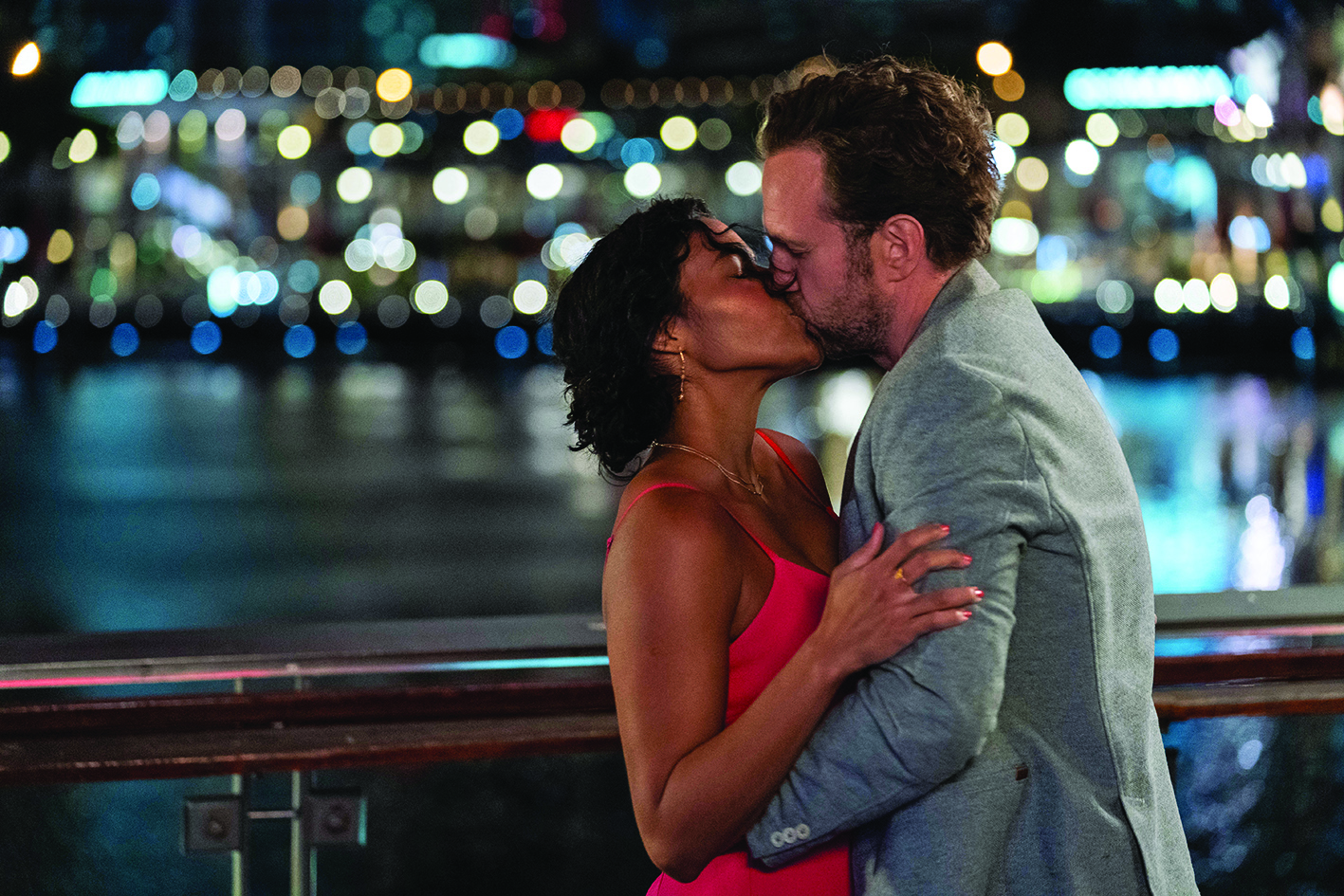The time-travel romantic comedy is a surprisingly fecund little subgenre. The ur-example is, of course, Groundhog Day (Harold Ramis, 1993), in which Bill Murray’s obnoxious and conceited TV weatherman is, through an unspecified mechanism, forced to relive the same day over and over again until he learns some kind of cosmic ethical lesson and can thus be freed from his temporal prison. The concept was revisited in Palm Springs (Max Barbakow, 2020), which sees Andy Samberg and Cristin Milioti as wedding guests in the titular resort town caught in a similar time loop. In the narrower context of Australian cinema, The Infinite Man (Hugh Sullivan, 2014) restricted its characters geographically rather than temporally, with protagonist Dean (Josh McConville) using time travel to try to re-create a perfect anniversary weekend with his girlfriend, only to come into conflict with numerous alternate versions of himself all travelling back to the same point in time.[1]See Myke Bartlett, ‘Against the Clock: Hugh Sullivan’s The Infinite Man’, Metro, no. 182, Spring 2014, pp. 12–7.
And, now, another Australian film joins the time-travel rom-com canon. Like The Infinite Man, Long Story Short (Josh Lawson, 2021) is anchored temporally by a wedding anniversary. Like Groundhog Day, its narrative engine is the need for its protagonist, Sydney-dwelling Brit Teddy (Rafe Spall), to learn some kind of moral – arguably spiritual – lesson about himself and the way he interacts with the world. Long Story Short even goes out of its way to namecheck Ramis’ film, vouchsafing its own genre savviness; but whereas Murray’s character is forced to live the same day over and over again, here Teddy is leaping forward in time in one-year increments, spending only a handful of minutes in each given year and struggling to make sense of the life he has ‘lived’, without his conscious knowledge, in the intervening time.
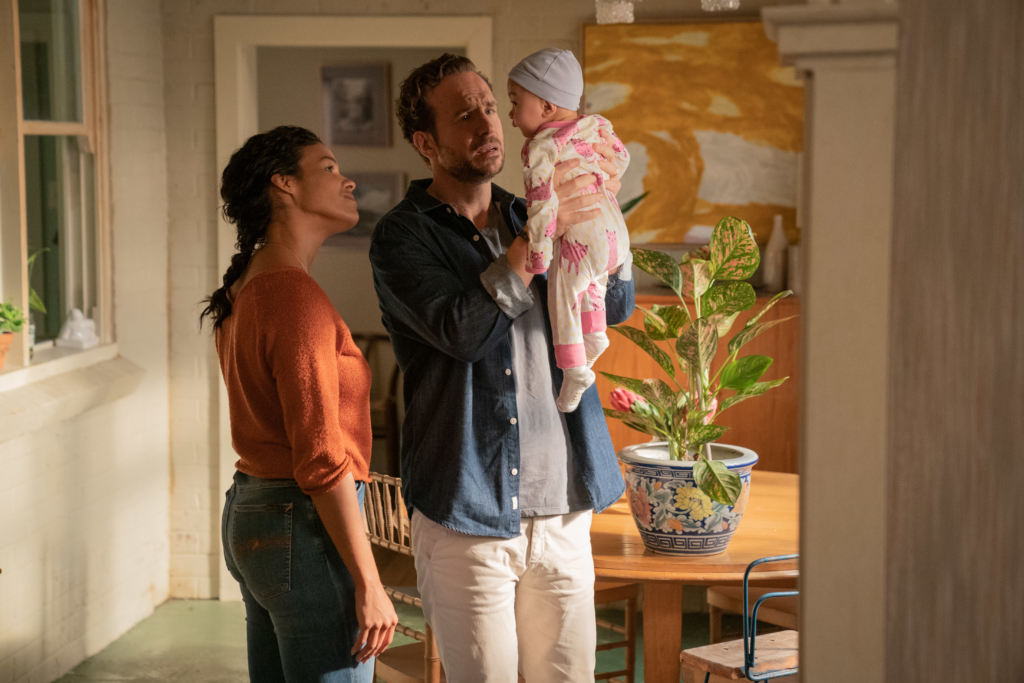
We first meet Teddy at a New Year’s Eve party, where he accidentally kisses Leanne (Zahra Newman), having mistaken her for someone else. Unluckily for him, she’s been eating nuts and he has an allergy, with the resulting medical emergency forming a perfectly serviceable rom-com meet-cute. Soon, they’re dating, but he’s hesitant to commit, focusing instead on his job (which he hates) and adamant that there will be enough time for everything down the track. A chance encounter with a mysterious stranger (Noni Hazlehurst) – who urges him not to waste time – prompts rushed nuptials just two weeks later, and afflicts Teddy with his time-travel curse: he is catapulted forward to his first wedding anniversary, then his second, third, fourth … and it is clear with each passing year that his life is getting worse.
In effect, Long Story Short asks us to deal with dual – even duelling – Teddys. There’s the hapless everyman whose direct experience we are following, and then there’s the unseen Teddy who is living the life that our Teddy is only briefly dropped into every year. We learn, along with our Teddy, that the latter is a less-than-stellar fellow: a workaholic who neglects his wife and child, and who is rarely present physically or emotionally. It isn’t long – and it’s an even shorter time, subjectively, for the time-travelling protagonist – before he is divorced, back with his ex-girlfriend Becka (Dena Kaplan) and seemingly trapped in an existence he would hate even if he were experiencing it at a normal rate. Can Teddy learn the hard lessons he needs in order to free himself from his ordeal?
Well, yes, of course – we as viewers are familiar with the tropes of the genre, and are in no way expecting to follow Teddy to his deathbed in a brisk ninety-five minutes. However, writer/director Lawson makes some intriguing choices that make Long Story Short more engaging and complex than its rote romantic-comedy trappings might first have you believe.

While Lawson’s first feature film as writer and director, The Little Death (2014), was also a romantic comedy – albeit much raunchier than the usual fare – it was an ensemble piece, exploring the sex lives of a large number of characters for comedic effect.[2]See Oliver Pfeiffer, ‘Behind Closed Doors: Josh Lawson on The Little Death’, Metro, no. 183, Summer 2015, pp. 40–3. By contrast, Long Story Short is a tight, very contained affair dealing with only a handful of characters and locations. Both the nitty-gritty details of Teddy’s plight and the state of his increasingly messy ‘real-time’ life are communicated through brief conversations between Teddy, Leanne, Becka, Leanne’s new partner, Patrick (played by Lawson himself), and Teddy’s best friend, Sam (played by Ronny Chieng, in perfect deadpan form). Physical and aesthetic changes to the world as time progresses are kept to a minimum, with only a few key details dropped in. At one point, Teddy finds himself sporting a full beard. At another, he discovers he now wears glasses. At yet another, he reaches for his phone, only to find it’s a ludicrously tiny gadget he can scarcely figure out how to use.
As Teddy, Spall nails the requisite combination of charisma and affable uselessness with a winning performance that ensures we are on his side, even when the evidence is mounting up that he’s been a pretty dreadful human being.
It’s a choice that keeps the film’s focus firmly on character, and Teddy’s character in particular. Teddy is of a type familiar to fans of romantic comedies – let’s call him The Almost Good Man. He’s not a bad guy, per se, but he’s selfish, insecure, emotionally stunted: essentially, a manchild.[3]For more on this cinematic archetype, see Mel Campbell, ‘Dawn of the Dad: Masculinity and Maturity in Abe Forsythe’s Little Monsters’, Metro, no. 203, 2020, pp. 20–5. He has some growing up to do, and it is the job of the universe (or, really, the screenwriter) to present him with mechanisms by which to do so, even if it’s a very specific type of time travel. As Teddy, Spall nails the requisite combination of charisma and affable uselessness with a winning performance that ensures we are on his side, even when the evidence is mounting up that, over the unseen course of his life, he’s been a pretty dreadful human being.
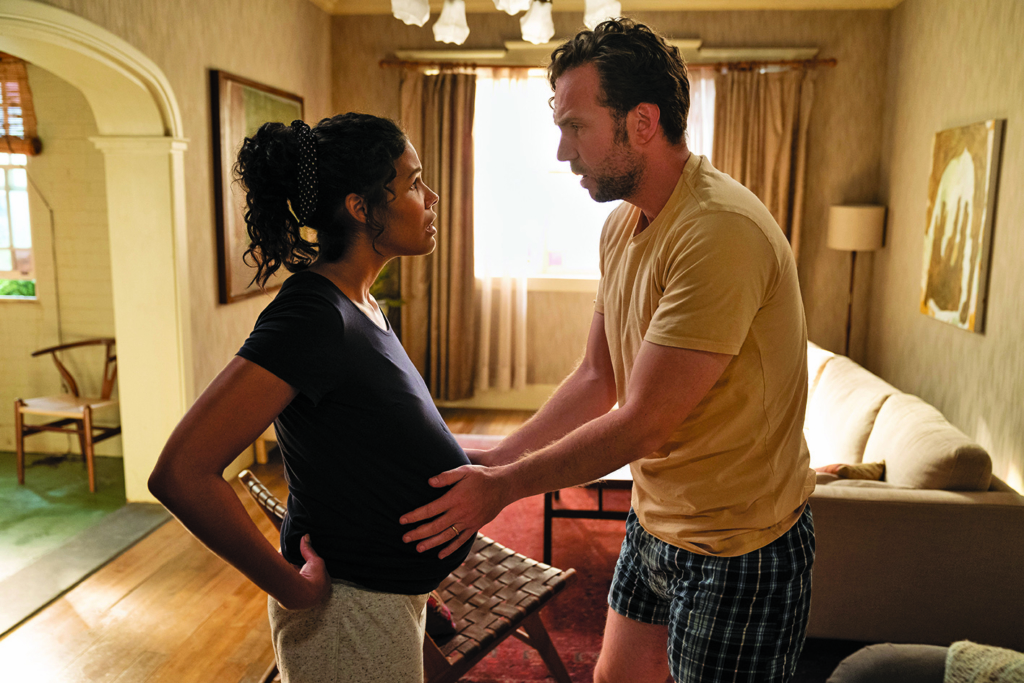
Indeed, it’s Teddy’s unseen shadow self that lends Long Story Short real depth and nuance. We, the audience, are with Teddy on his leapfrogging journey through time, and so we empathise with him. Would we be as on side if we spent time with ‘real-time’ Teddy? I’d argue not; we have to parse various conversations and confrontations for clues, but that guy is not the stuff rom-com leads are made of. There’s more than a hint of misogyny in his character – or, at the absolute least, unexamined male privilege. On one annual interlude, he is appalled to find that he has apparently asked Becka to move in with him and immediately walks it back, protesting that he still loves his wife. Becka, in a moment of honesty and clarity, sets him straight about what they mean to each other. ‘You weren’t my first choice either, Teddy,’ she tells him, going on to say that ‘there’s nothing lonelier than being with the wrong person’. With ‘real-time’ Teddy’s behaviours off screen and only alluded to, we are left to wonder, along with our Teddy, what he has done to arrive at so low a point.
Teddy is oblivious to his own shortcomings because he doesn’t experience them, which is about as on point a parable for clueless self-interest as one could hope for.
His sin, of course, is a lack of emotional intelligence, and the time-travel gimmick is a very effective metaphor for that failing. Due to the way he’s dropped back into his life for only minutes at a time, Teddy literally doesn’t know what he’s done wrong in the intervening year; indeed, he doesn’t know that he has done anything wrong. He is oblivious to his own shortcomings because he doesn’t experience them, which is about as on point a parable for clueless self-interest as one could hope for. Moreover, much of the film consists of a number of women – Newman’s Leanne, Hazlehurst’s stranger, Kaplan’s Becka and Teddy’s daughter, Tallulah (played by a series of young actors as the years progress[4]Tallulah is embodied by Genevieve Vasdeva, at the age of six months; Amelia Scurrah, at eighteen months; and Cheyenne Gunn, at eight years.) – trying to explain to him where he has messed up. One suspects that, even if time were running true, such conversations would still be necessary. This is the lesson that Teddy needs to learn: never mind the film’s occasional lip service to notions of carpe diem and YOLO; he simply needs to start being present enough to actually listen to and understand the people – most notably, the women – in his life.
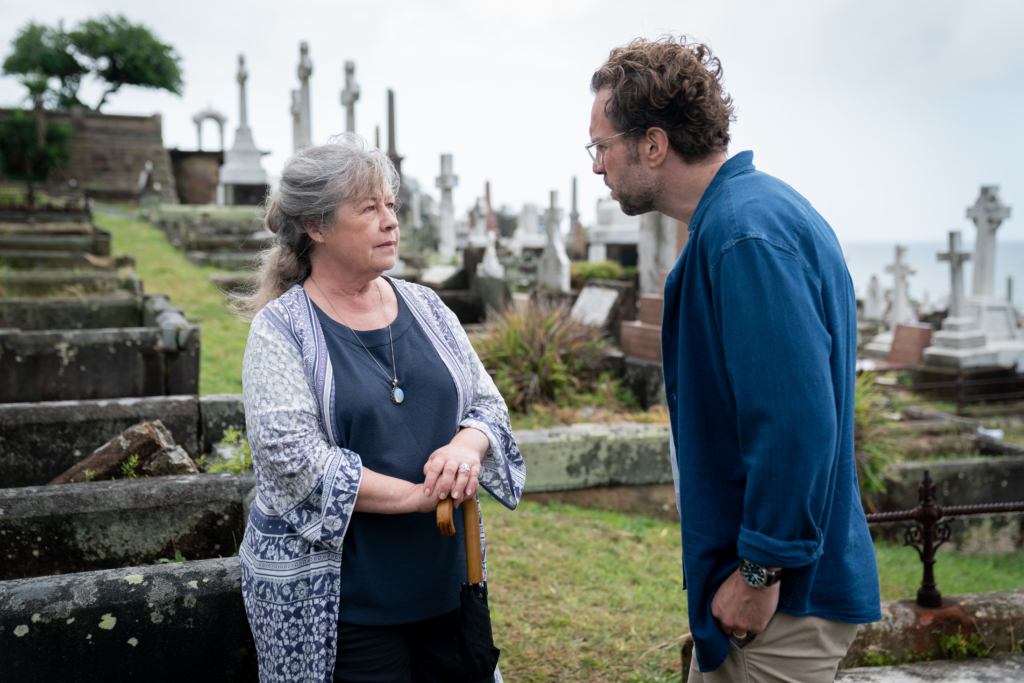
Long Story Short’s other major thematic throughline is, of course, mortality – and perhaps a third film from Lawson following this and The Little Death will demonstrate whether it’s a recurring area of interest for the filmmaker. References to death abound in the film from the first scene, in which Teddy suffers a potentially fatal allergic reaction – later, at one of his lowest ebbs, he’ll contemplate suicide by peanut chocolate bar. Our inciting incident takes place at the grave of Teddy’s father, where our protagonist laments that, if he hadn’t taken five years to propose to Leanne, his dad might have been able to see them married. Teddy’s ongoing year-at-a-time leaps forward into his future carry with them, largely unspoken, the looming threat of death.
This thread is dramatised and foregrounded through the character of Sam, who one year appears haggard and losing hair due to a battle with skin cancer. Teddy, true to form, takes a while to comprehend what’s going on before the penny drops, his obliviousness to Sam’s illness neatly and effectively combining Long Story Short’s two key themes. Sam promises that his treatments are working and that he’ll be around for another fifty years – no, in fact he plans to live forever. Skip forward, and when Teddy next tries to contact Sam, his phone number is disconnected: his best friend is dead. It’s a wake-up call for Teddy, and it’s very interesting that it’s the death of his male best friend, and not the harms he’s done to the women in his life, that really shakes him up. While there’s a pleasing neatness to the way Lawson once again dovetails these two key themes – Teddy’s emotional immaturity and the spectre of mortality – a bolder choice might have been to really dig into why Teddy is more emotionally open, or at least vulnerable, with male figures in his life rather than female ones.
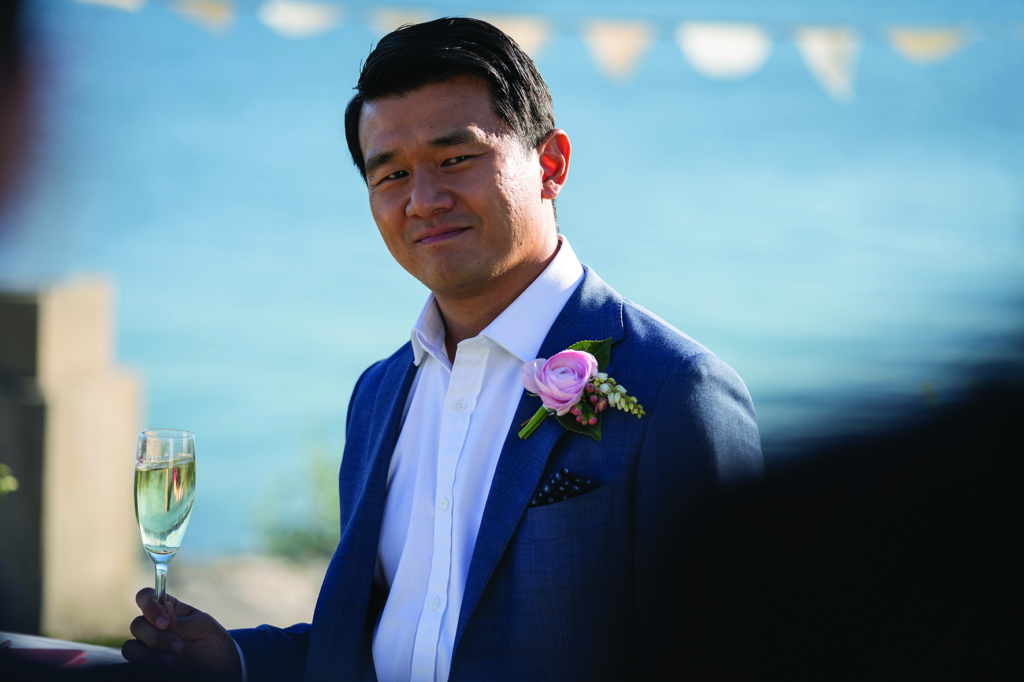
In any case, Teddy eventually gets a do-over, much like Jimmy Stewart’s George Bailey in It’s a Wonderful Life (Frank Capra, 1946). This is a romantic comedy, not some Kafkaesque existential torture: once Teddy learns what he needs to, he’s catapulted back to his ‘home’ time thanks to a magical MacGuffin provided by Hazlehurst’s stranger. Retaining his knowledge of future possible events, he effectively has a cheat sheet for his life, immediately taking steps to ensure the calamities he’s seen down-future won’t befall him – or, at least, may not, at any rate (for his part, Sam gets a phone call demanding he get yearly skin checks).
As a conclusion, it’s both very appropriate in terms of genre and faintly disappointing. In a later conversation with the stranger, she admits to having gone through a similar experience, and that it resulted in her making some radical changes to ensure she had a life worth living; but, for Teddy, the solution ends up being as simple as addressing his work–life balance and being a better listener. Spare characters whose lives will also be affected by Teddy’s new knowledge of the future, such as Patrick and Becka, are presumably left to their own devices, unless Hazlehurst’s character decides to intervene there too. Obviously, a happy ending is hard-coded into the film’s DNA, but it feels like there was a missed opportunity for Teddy to really grapple with himself and his failings without the film needing to divert from the romantic-comedy format.
Nonetheless, this is an excellent offering from Lawson, a comedy filmmaker whose strong commercial sensibilities and willingness to strive for thematic depth put him well ahead of the Australian pack. It’s those same sensibilities, perhaps, that have resulted in a more creatively conservative denouement for Long Story Short, but we shouldn’t complain too loudly – if there’s one thing common to almost all forms of cinema, it’s the tension between artistry and populism, and Lawson negotiates that tricky terrain better than most.
Endnotes
| 1 | See Myke Bartlett, ‘Against the Clock: Hugh Sullivan’s The Infinite Man’, Metro, no. 182, Spring 2014, pp. 12–7. |
|---|---|
| 2 | See Oliver Pfeiffer, ‘Behind Closed Doors: Josh Lawson on The Little Death’, Metro, no. 183, Summer 2015, pp. 40–3. |
| 3 | For more on this cinematic archetype, see Mel Campbell, ‘Dawn of the Dad: Masculinity and Maturity in Abe Forsythe’s Little Monsters’, Metro, no. 203, 2020, pp. 20–5. |
| 4 | Tallulah is embodied by Genevieve Vasdeva, at the age of six months; Amelia Scurrah, at eighteen months; and Cheyenne Gunn, at eight years. |
